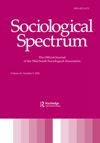伊斯兰恐惧症:社会距离、回避和威胁
IF 1.1
3区 社会学
Q2 SOCIOLOGY
引用次数: 3
摘要
选取选修社会学导论课程的大学生(N = 610)为研究对象,探讨了阿拉伯人、巴基斯坦人和穆斯林相对于其他种族和宗教群体的态度和社会距离。数据收集于2010年至2016年间,使用了Bogardus社交距离量表和16项伊斯兰恐惧症量表。受访者将阿拉伯人、巴基斯坦人和穆斯林排在亲密等级的最底层。在多元回归分析中,种族、宗教、政治派别和偏好的新闻来源对伊斯兰恐惧症得分进行了回归,我们发现,作为基督徒、共和党人和观看福克斯新闻(Fox news),无论是单独还是一起,都会显著影响对穆斯林和来自这些地区的人的负面态度,而认识一个穆斯林会减少这些观点。本文探讨了这些情绪的持久性。本文章由计算机程序翻译,如有差异,请以英文原文为准。
Islamophobia: Social Distance, Avoidance, and Threat
Abstract A sample of undergraduate college students (N = 610) enrolled in Introductory Sociology courses participated in a study exploring attitudes toward and social distance from persons who are Arab, Pakistani, and Muslim vis a vis other ethnic and religious groups. Data were collected between 2010 and 2016 using the Bogardus Social Distance scale and a 16-item Islamophobia scale. Respondents positioned Arabs, Pakistanis, and Muslims at the bottom of a closeness hierarchy. In multiple regression analyses where race, religion, political affiliation and preferred news source are regressed on Islamophobia scores we find that being Christian, being a Republican and watching Fox News, separately and together, significantly influence negative attitudes toward Muslims and persons from those regions, while knowing someone Muslim diminishes these views. The persistence of these sentiments is explored.
求助全文
通过发布文献求助,成功后即可免费获取论文全文。
去求助
来源期刊

Sociological Spectrum
SOCIOLOGY-
CiteScore
3.80
自引率
5.60%
发文量
16
期刊介绍:
Sociological Spectrum publishes papers on theoretical, methodological, quantitative and qualitative research, and applied research in areas of sociology, social psychology, anthropology, and political science.
 求助内容:
求助内容: 应助结果提醒方式:
应助结果提醒方式:


